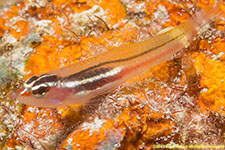
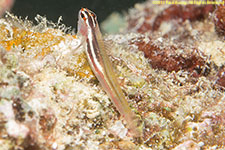 White-line pygmy-goby, Eviota mikiae
White-line pygmy-goby, Eviota mikiae Gobies are relatively small, including some of the smallest vertebrates. They are generally bottom-dwelling and are prey species for commercially important fish. Gobies have fused pelvic fins that form a disc-shaped sucker. Some gobies form symbiotic relationships with other species such as burrowing shrimp.

 White-line pygmy-goby, Eviota mikiae
White-line pygmy-goby, Eviota mikiae
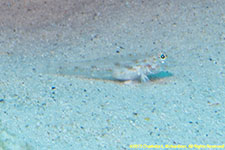 Crocus shrimp-goby, Ctenogobiops crocineus
Crocus shrimp-goby, Ctenogobiops crocineus
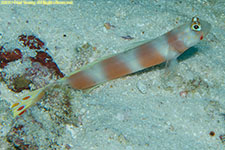 Pink-bar shrimp-goby, Amblyeleotris aurora
Pink-bar shrimp-goby, Amblyeleotris aurora
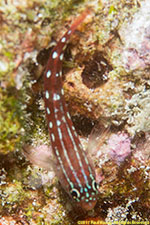 White-spotted pygmy-goby, Eviota zebrina
White-spotted pygmy-goby, Eviota zebrina
Blennies are small, elongated fish with relatively large eyes and mouths. Their dorsal fins are often continuous and long. The pelvic fins typically have a single embedded spine and are short, slender, and located before the pectoral fins. The tail fin is rounded. They often have elaborate cirri on their heads.
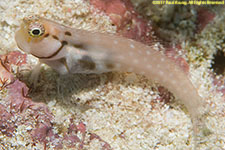 Maldives blenny (Little combtooth blenny), Ecsensius minutus
Maldives blenny (Little combtooth blenny), Ecsensius minutus
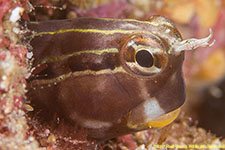 Lined combtooth blenny, Ecsenius lineatus
Lined combtooth blenny, Ecsenius lineatus
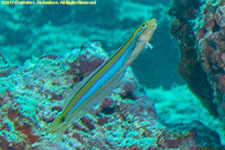 Tube-worm blenny, Plagiotremus rhinorhynchos
Tube-worm blenny, Plagiotremus rhinorhynchos
There are at least four genera and more than sixty species of sand perches (grubfish), four of which are found in the Maldives. Grubfishes are diurnal and dig into the sand for shelter and to sleep. They eat small animals and zooplankton.
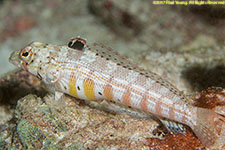 Maldivian grubfish, Parapercis signata
Maldivian grubfish, Parapercis signata
©2018, 2019, 2024 Mermaid Underwater Photographic. All Rights Reserved.
Contact us at mermaid@underwater.org.
Last modified 1 November 2024